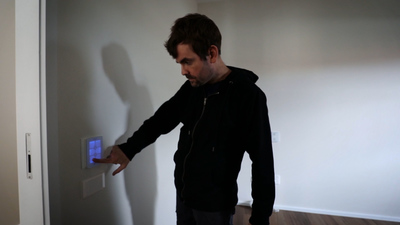Assisted-living technology providing home independence

Independence is something most of us take for granted. It’s central to our dignity and general wellbeing. It’s not something you notice until it’s gone. Yet determining how to keep or regain your independence is a challenge that hundreds of thousands of Australians face every year — and the public health and aged-care system is finding it hard to keep up.
More than 4.2 million Australians have some form of disability. There are also 3.7 million Australians over the age of 65. Enabling Australians who are aged or with disabilities to continue living in their homes with customised assisted-living technology is critical to wellbeing, and it does it in a way that preserves or increases independence with dignity. It also reduces the reliance on specialist health facilities and eases pressure on the health system.
The use of smart care technology is a reliable and customisable solution that enables those with ‘care in the home’ needs to live with dignity, independence, choice and control. It allows friends, family and carers to have the peace of mind they need for their loved ones to continue living unaccompanied.
For example, these technologies have the ability to monitor daily activities, sending alerts and notifications when something specific does or does not happen. The range of assistive in-home technologies such as motion sensors, automatic appliances, temperature control capability, smart speakers and emergency support come together as an intelligent monitoring platform, detecting deviations in day-to-day routines, using data analysis to provide wellness insights and improve decision-making for care providers and families.
Smart care technology provider HomeStay Care recently installed its assistive technology into disability housing in Melbourne in conjunction with St John of God Accord. The house was designed in collaboration with occupational therapists to meet the individual needs of residents with intellectual disabilities and complex needs, with HomeStay’s technology a key part of the creation and construction of an enabled lifestyle.

The house features the Intelligent Home system — a suite of assistive living technology designed to be subtly incorporated into specialist care facilities and family homes. In addition, the home is supported by two new HomeStay applications: MyDay and Carers Companion. Carers Companion is an app that has been designed for carers to enhance and support care delivery by capturing key information and streamlining the carers’ shift-handover process. Through the app, carers can capture residents’ key daily wellness indicators, engaging residents with cognitive challenges in the process and gaining insights from trends and patterns. Carers can centrally manage weekly meal plans, resident activities and carer schedules, and easily induct new residents into homes.
As part of the Intelligent Home system, residents can use the MyDay application to effectively manage their day with greater independence. The application promotes decision-making, mental stimulation and interactions with families, friends and carers. MyDay promotes independent living and reduces anxiety by allowing users to simply view and visualise the day’s activities through imagery and simple graphics. The app also includes a voiceover feature to assist blind and partially sighted clients.

This type of integrated assistive technology is highly valuable, supporting residents to develop greater independence and choice in undertaking their daily activities. The healthcare industry recognises the need for technology in the home to support the individual to do more, and enable carers and families to focus on quality of life over labour-intensive tasks. Smart care technologies, like HomeStay’s assistive applications, are providing a unified technology care platform offering features and functions that are modular in design and used on-demand.
As an ageing population continues to strain the public health system, assisted living technology will become increasingly popular to ease carers’ workload and allow loved ones to remain independent for as long as possible. With smart home software and hardware enabling further autonomy, this will quickly become an expectation families have when seeking in-home-care options.
In Conversation with Australasian Institute of Digital Health CEO Anja Nikolic
Hospital + Healthcare speaks with Australasian Institute of Digital Health CEO Anja...
Cutting-edge digital health tools putting plastic, silicon and steel to the sword
The Australian Digital Health Agency's Chief Digital Officer sets out some sustainable...
How are AI models approved for use in health care?
Hospital + Healthcare speaks with the Therapeutic Goods Administration to...

![[New Zealand] Transform from Security Awareness to a Security Culture: A Vital Shift for SMB Healthcare — Webinar](https://d1v1e13ebw3o15.cloudfront.net/data/89856/wfmedia_thumb/..jpg)
![[Australia] Transform from Security Awareness to a Security Culture: A Vital Shift for SMB Healthcare — Webinar](https://d1v1e13ebw3o15.cloudfront.net/data/89855/wfmedia_thumb/..jpg)




